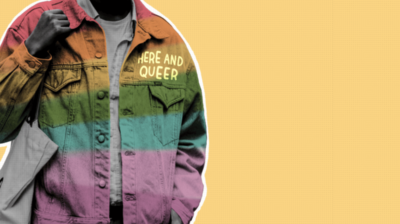I am unsure of my identity. What should I do?
Learn more about sexuality, gender identity and gender expression

Our identity is something which continuously develops and grows throughout the course of our lives. It can be made up of many different factors which can include our nationality, ethnicity, religion, sexuality, gender, family influences, personal interests and beliefs. There is no one way to define how a person identifies or understands themselves. We will all have experiences as individuals that will influence how we identify and it is normal for how we identify to change repeatedly.
How do I know what my identity is?
If you feel unsure of your identity this is completely normal. There is never any need to feel you must identify as one thing or another, but if you do choose to do so remember that you can always change your mind again. We do not always need to share with others how we identify, as it can be a deeply personal thing. If we do decide to be honest about a part of our identity with others we should never feel like we have to conform to one identity in order to make them happy. Below are some aspects that can make up different parts of our identities.
Sexuality = How and what we enjoy sexually
Sexuality is compiled of many different aspects such as our sexual desires for others, our thoughts and attractions and how we express ourselves to others. Our sexual identity is something which may stay the same throughout our life or change over time. A person can also be asexual, where they have a low or absent interest in sexual desire or sexual activity. If you are unsure of your sexual identity remember that this is completely normal and there are services that you can turn to if you want some support. You can find information on some of the support services available to LGBTI+ young people at the bottom of this article.
Sexual attraction = Who we like
Our sexual attraction refers to who we are sexually and/or romantically interested in. A person may only like people with a different gender to themselves, and might identify as straight or heterosexual. A person might identify as lesbian, gay, or homosexual if they are attracted to people who have the same gender as themselves. Many people do not define their sexual identity in a binary way and instead would be attracted to a variety of different people. Examples of sexual identity can include bisexual, pansexual or queer, but there are many other types of identities. Although many people identify as straight, gay, lesbian, or bisexual, these are not the only sexual identities, and many people choose not to use a label to define their sexuality.
Gender identity = How we feel on the inside/our personal sense of gender
Traditionally, a person’s gender is assigned to them at birth by examining the baby’s genitals. If a baby has a penis, the baby is assigned male at birth, and if they have a vulva, the baby is assigned female. But gender is not binary of either male or female, and someone’s gender does not need to be based on their genitals or sex characteristics. Gender is something which is composed of many different factors which help form us into the people we are. These factors can include our bodies, our identity and our expression of self. Your gender is who you feel that you are, and this can align with the gender you were assigned at birth, or it may not.
People who identify with the gender they were assigned at birth are often referred to as cisgender, and those who do not identify with the gender they were assigned at birth can be transgender or agender (without a gender). A transgender man may have been assigned female at birth, but know that this is not their gender. A non-binary person may have been assigned male at birth, but they know they are neither a man nor a woman. The term Trans is often used as an umbrella term for all those whose gender differs from the sex they were assigned at birth. Gender is personal, and it is often defined by the social and cultural standards of a certain community. Gender roles and identities vary in different parts of the world. For some people their gender can be something which is fluid and can evolve over time, and for others it is a constant.
Gender expression = External expression (Our behaviours, mannerisms, interests, and appearance in relation to our gender)
Our gender expression is the way we show our gender to the world around us through things such as our clothes, hairstyle and mannerisms. For some people their gender expression aligns with a specific gender identity such as a person who identifies as a woman and likes to express themselves in traditionally feminine ways. For many people their gender expression and their gender identity do not align in a traditional sense, and they express themselves through a variety of ways. If you identify as a man or a woman but do not feel like you want to conform to gender expression norms, this is perfectly normal. Traditionally things such as clothes, grooming, behaviours and activities were assigned to a certain gender, such as boys having short hair, wearing trousers, liking blue and playing with cars, and girls liking pink, growing their hair long, wearing dresses and playing with dolls. These are not natural tendencies, but rather traditions or ‘norms’ that are placed on children by their family, community, and society.
If you feel like you are different because you do not like the same things as the people around you or other people with your gender, this is a common experience. You do not have to conform to traditional expectations for your gender, and you do not have to accept the gender you were assigned at all. How we express ourselves is something which can constantly change overtime, we do not have choose a style and stick to it.
What supports are there for LGBTI+ young people?
BeLonG To
BeLonG To youth service is an organisation for LGBTI+ young people in Ireland that offers advice and support services, as well as running youth groups. If you are unsure of your sexual or gender identity and would like to speak to someone about it, BeLonG To offer a variety of different supports for young people both online, over the phone, and in person.
TENI
If you are questioning your gender or feel that the gender you were assigned at birth is not right for you speaking to others who have had similar experiences can help. Teni (The Transgender Equality Network Ireland) also offer support for transgender people and their families, you can visit their website here.
You can find more information on gender and sexuality in our LGBTI+ section.
Need more information?
We are here to answer your questions and talk through your options. Our online chat service is for 16 to 25 year olds and is available Monday to Friday, 4pm to 8pm. Chat to us now about your situation.
- Chat now to a trained Youth Information Officer
- Or leave us a message and we will email you back






